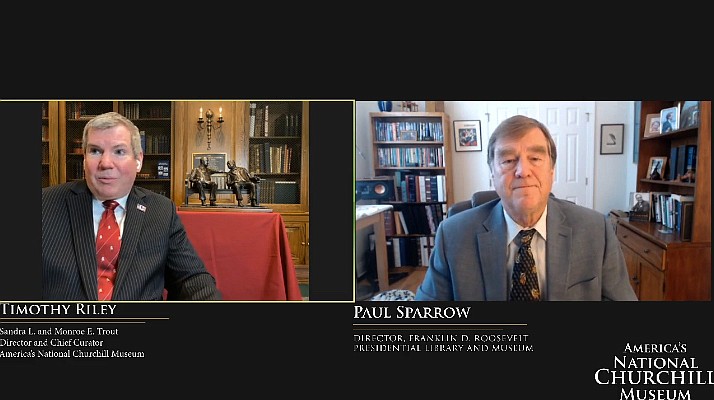Winston Churchill's 1941 visit to the White House with President Franklin D. Roosevelt in some ways resembled a romance or a holiday tale.
"The correspondence that went back and forth between London and Washington was rapid and constant," National Churchill Museum Chief Curator Timothy Riley said. "In many ways Churchill was trying to woo Roosevelt famously to get him to lend some aid and support to the war effort that London and Britain were standing alone virtually for for such a long time."
The wooing took place in letters back and forth - one side desperate, the other reluctant. But then, it succeeded and an invitation to Christmas was extended.
As this year's holiday approaches, the National Churchill Museum hosted a webinar featuring Franklin D. Roosevelt Presidential Library director Paul Sparrow to discuss the fateful Christmas visit.
Though much of the discussion was serious - the impetus for the visit was the bombing of Pearl Harbor and the U.S.'s entrance into World War II - moments of comedy did come up in Sparrow's virtual exchange with Riley, including a "bathroom" incident.
At one point during the visit, Churchill and Roosevelt experienced the nightmare of many house guests when Roosevelt burst into Churchill's room excited to share an idea, only to find the British prime minister naked, having just stepped out of the bath.
"Roosevelt, of course, was mortified and very embarrassed and said, 'Oh, please excuse me, Mr. Prime Minster, I'm sorry,'" Sparrow said. "He starts to wheel out of the room and the prime minister is alleged to have said, 'The prime minister of Great Britain has nothing to hide from the president of the United States.'"
Churchill stayed in the U.S. for three weeks, taking over a room that he used to keep track of all of the information from the war. This "map" room inspired Roosevelt to create his own map room, a predecessor for the situation room.
On Dec. 23, Roosevelt and Churchill met the press.
"People who watch presidential press conferences these days really don't understand what FDR did with his press conferences," Sparrow said.
Roosevelt invited the press into his office and answered their questions. When Churchill visited, many wanted to be in the room. With security measures increased with the beginning of the war, Roosevelt said they had to prevent a wolf from sneaking in ahead of the press conference.
The president joked for Churchill, all of the press might seem like wolves compared to the British press, who he likened to lambs.
"The reporters loved FDR because he was always good copy," Sparrow said. "He treated them with respect."
Churchill was relieved the U.S. had joined the war and his remarks to the press reflect that.
"He was asked by one of the reporters, 'how long to victory?'" Riley said. "Winston Churchill famously said, 'Well, only half as long as if we do it badly.'"
The next day, the two leaders lit the White House Christmas tree and Churchill gave a speech.
"Some of his words strike home in 2020 if you listen to them," Riley said. "He said, 'I spend my anniversary and festival far from my country, far from my family, yet I cannot truthfully say that I feel far from home.'"
Churchill noted the joy of Christmas for children, as well as the "stern task" the countries faced in the war.
"Resolved that by our sacrifice and daring, these same children shall not be robbed of their inheritance or denied their right to live in a free and decent world," Riley quoted Churchill.
Two days later, Churchill became the first British prime ministers and one of the first foreign leaders to address a joint session of Congress, Sparrow explained, raising morale while still being honest.
Roosevelt spoke to Congress later during his 1942 State of the Union address, claiming that the U.S. would increase its industrial production at an astonishing rate.
"Both Churchill and Roosevelt exuded that 'in the end, we will win,'" Sparrow said.

